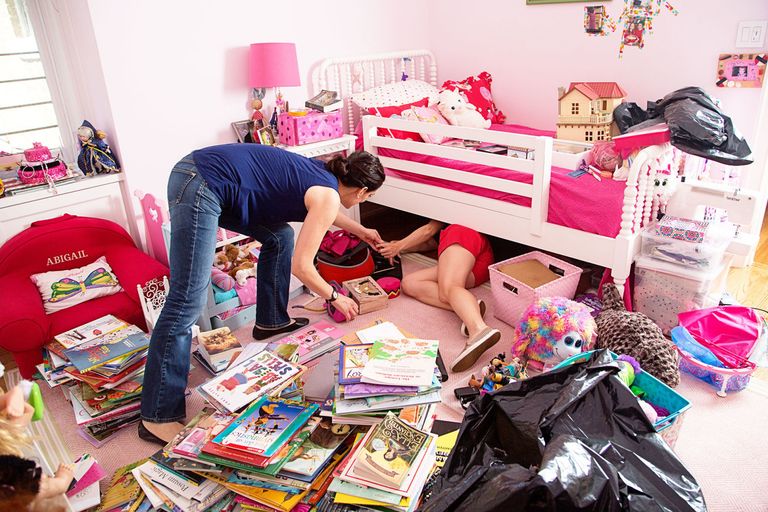“Children make love stronger, the days shorter, the nights
longer, savings smaller and a home happier”-Author Unknown
Kids are great.
They bring laughter to any home and are a job to be around.
Their rooms, however, would be another story. In fact, if there is one room in
the house that you wish you could never see again, it would probably be their
room. Unfortunately, as with most little tots, children have a unique affinity
for clutter and a disorganized mess. It seems that whenever you walk into their
rooms, it would be in a perpetual state of disarray. With books, toys, clothes
and art supplies strewn all over, their room would often bear the resemblance
of a war zone. However, while clutter in a kid’s room is to ne expected—natural
even, it can be potentially disastrous. To some, a small toy on the floor might
seem like an insignificant piece of clutter one can overlook, but it can
possibly translate into a broken arm or leg for your kids or anyone who might
step on it and slip. Indeed, your children’s clutter can create a myriad of
precarious situations and hazards that you would need to look closely into.
However, this is not to mean that you should be doing all the work—especially if
your little tot is rather keen on keeping their rooms messy.
Not to worry, while it might seem like an impossible task,
keeping your kids’ rooms clean and organized and getting them to help do just
that would be very much possible. All you need to do is to approach the idea
with a strategy. Whether your kids have a small room in 1br condo for rent inMakati or elsewhere, here are some of the surefire ways you can keep their
rooms clutter-free:
1
Involve your kids from the beginning
As with any work task or chores your kids
have to do at home, it is imperative that you involve them from the very
beginning so that they can incorporate these into developing their habits. Work
with them and not around them. You might be surprised but your kids—even ones
as young as three years old—would be very enthusiastic about helping. Furthermore,
involving them in cleaning and organizing their rooms would make them feel a
sense of ownership over the project. As a result, they would be more receptive
to keeping their rooms clean and organized. If not, at the very least, they
would know where their toys, books, clothes and other things should go.
Have your kids give you a tour of their room before you start decluttering
Do not begin the task by asking your kids
to choose which of their stuff should stay or go as that would create
unnecessary tension and they would see that as an unwelcome invitation to part
with their stuff. Instead, have them give you a tour of their room which would
also give them the chance to look around their room. In this way, you get a
sense of what is important to them and what is not. It would then set the tone
of how you should go about your organizing and decluttering endeavor. Furthermore,
it is important to mirror back your kids’ language while you are organizing
with them. If they call a certain thing in their room as their favorite, it is
important that you call it that way too. Apart from letting you realize the
importance of the item, it would also make them see that you are on their side.
Remember, trust is very important—especially when you are asking kids to part
with their items. In this way, you would be able to distinguish which of the
things are important to them and which ones are not.
3 Talk about how their stuff has a home
Kids tend to personify their things, so be
sure to take this into account when you are organizing with them. Ask them
things such as, “Do you want this to live with you?”or “Where should this live?”
when you ask them about where their stuff should be placed. Asking them to put
things away tends to sound aggressive and may have a negative connotation to
your kids. Instead of saying “put that away”, request them to “Put it where it
lives” instead. Talking about it in the latter manner tends to color the task
in a positive light.
Give your kid permission to let go of stuff they do not want
One thing that can easily distract a child
from the task at hand is the sheer volume of the things they have in their
rooms. When they have too many things in their room, the task can easily escalate
from a manageable one to an overwhelming one to them—something that you would
not want if you want to count on them pitching in their help. In this regard,
allow them to let go of the things that they do not want. However, be sure to
portray the task in a positive light. Tell them that you are not just getting
rid of their things, but are simply finding them new homes by donating them to
charity.
5 Lead by example
Remember, kids are very impressionable and if
they see you doing something you should not be doing then they are going to
call you out on it. Even worse, they may see it as an excuse when they mirror
your behavior. Lead by example and reevaluate your cleaning and organizing
habits as well. After all, you want your kids to model your good behavior, so
be conscious enough to form good organizing habits of your own as well. Even
something as small as putting away your keys can already serve as a lesson to
them.


Comments
Post a Comment